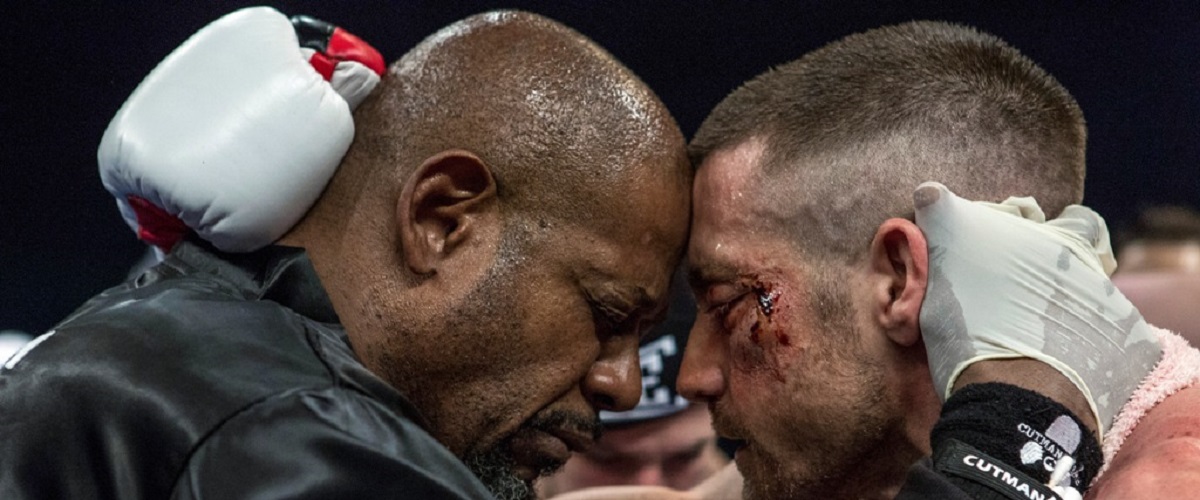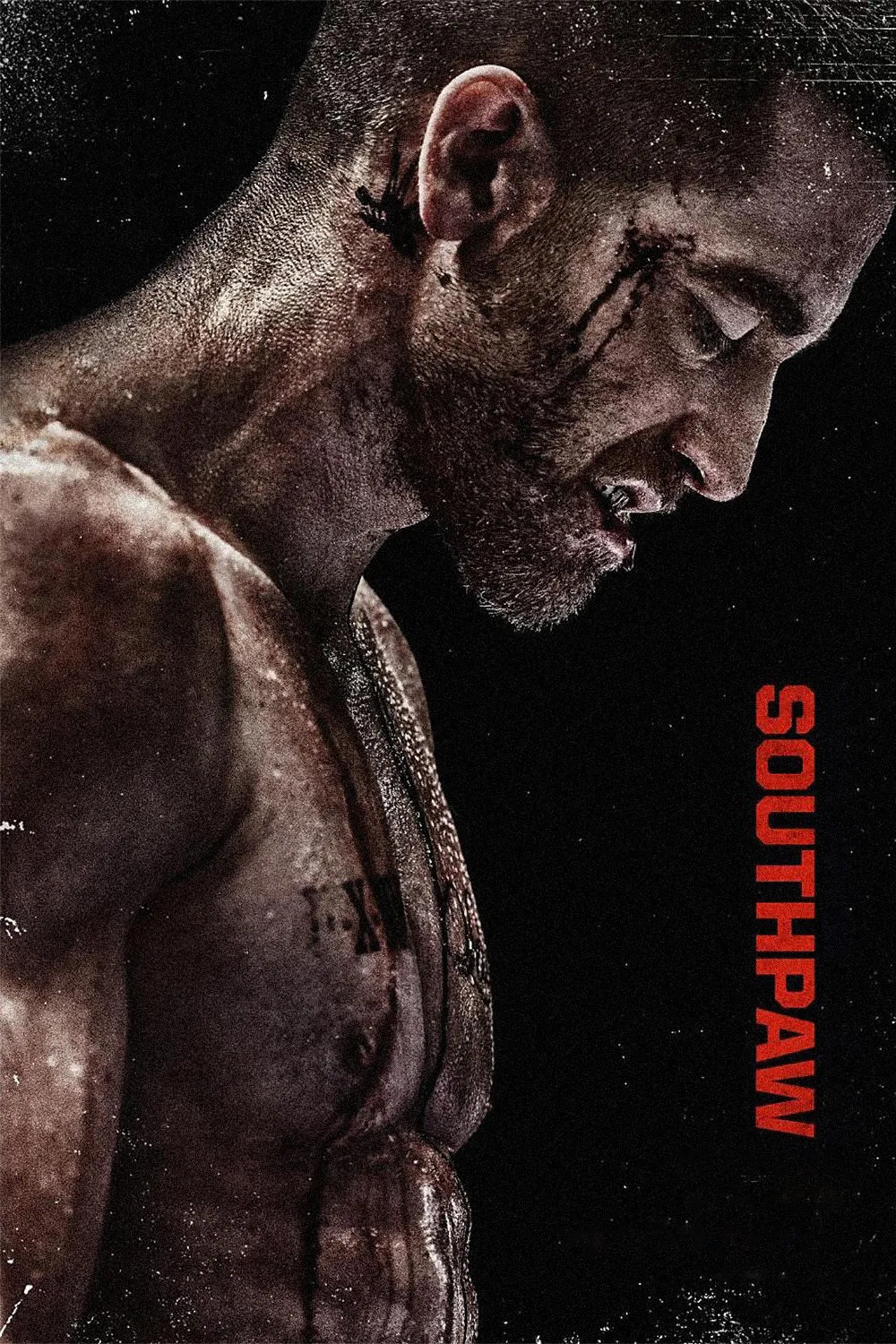Boxing isn’t a sport of surprises. It’s not about who can throw the most original punch or dodge in a brand-new fashion. Like so many sports, it’s about mastering techniques and repeating those moves more fluidly than the competition. And so the familiarity of Antoine Fuqua’s “Southpaw” feels almost appropriate for the subject matter. There are so few narrative surprises in this traditional tale of a boxer felled by personal tragedy who rises again to save the one person in his life who matters to him that one can pretty much map out the entire venture from the preview. And yet not every film needs to reinvent the wheel. Working from almost exactly the same template he did on “Sons of Anarchy”—a show that verged on Greek tragedy and also presented men who exist in worlds of violence and are often undone or saved by their children—writer Kurt Sutter plays with the very familiarity that will drive some critics away but comfort viewers looking for an old-fashioned tale of redemption. As I wrote about “Sons of Anarchy” two years ago, “Watching characters, with whom we can identify, persevere through the proverbial fire allows us to believe we can surmount comparatively minor obstacles in our own lives.” The exact same thing applies to “Southpaw.”
The increasingly remarkable Jake Gyllenhaal transforms himself yet again as Billy Hope, a boxing champion near the end of his career. “Southpaw” opens with an atypically difficult fight for the champ, one that goes into the late rounds and leaves him battered and bloodied. His wife, Maureen (Rachel McAdams), encourages him to take a break. As she warns him, two more years of this and he’ll be punch-drunk and unable to spend time with the most important person in his life, his daughter Leila (a breakthrough child performance from Oona Laurence, genuinely in the moment in every scene). Billy doesn’t know much outside of boxing. He grew up in child services, which is where he not only met Maureen but the posse of friends who hang around after fights and encourage his rise to fame.
As often happens in the world of boxing, a newcomer wants a shot at the King. Miguel Escobar (Miguel Gomez) is a younger, more agile fighter who shouts at Hope after press conferences that he wants his time in the ring. Promoter/manager Jordan Mains (Curtis ’50 Cent’ Jackson) doesn’t want to schedule the Escobar vs. Hope fight yet, trying to get a few more wins (and their accompanying cash payouts) in the books. Hope wants the big match, but everything changes when a physical altercation between the often-violent pugilist and the rising star ends in gunfire. When the smoke clears, Maureen has a bullet-sized hole in her stomach and Billy’s life has been forever changed. He’s been barred from the only thing he knows, spirals into suicidal behavior, and risks losing his daughter forever. Can he rise again?
On “Sons of Anarchy,” and even “The Shield,” for which he was a formative writer, Kurt Sutter examined the intersection of aggression and emotion. Men like Jax Teller and Vic Mackey were willing to cross lines of violence to save those they loved and their ways of life. In many ways, Billy Hope falls into this lineage. He is a man who has had a tough upbringing and knows little more than how to fight and love—two elements of human existence that many people would think are on different ends of a spectrum but that Sutter has always presented as living in unison in some men, especially those who have had to fight their entire lives. When everything that matters to Billy Hope is taken away from him in one instant, he doesn’t so much shift gears as rebuild the essence of who he’s always been, going to a new trainer named Tick (Forest Whitaker) and trying to find his center. Sutter recognizes that men like Hope (or Teller for that matter) are at their best when they are committed and devoted to what drives them.
Gyllenhaal gets that too. In the ring, he plays Hope as a force of nature, screaming into the camera, blood intermingling with spit that hits the lens. Outside of the ring, Gyllenhaal recognizes that men like Hope are often insecure, even shy when they’re talking about personal, emotional things. Look at how Gyllenhaal carries himself differently with the boys in his entourage, Jordan, his wife, and, eventually, his new trainer. In scenes of potential redemption, such as when he’s talking to Tick or Leila’s case worker (Naomie Harris), he lowers his gaze, almost like a child hoping to get the answer that he so desperately needs. Again, Gyllenhaal’s physicality says more about the character than anything in the film. Just as he did in “Prisoners” and “Nightcrawler,” Gyllenhaal makes daring, confident decisions. He has quietly turned into one of our most physically confident actors. And it’s nice to see his strong work here matched by an excellent turn from Whitaker as well. Sadly, too much of the rest of the ensemble (other than Laurence) feels like a plot device, especially Harris’ case worker.
Director Antoine Fuqua is no stranger to stories of the dangers of macho male aggression, and he proves to be a good fit with Sutter. His style is aggressive, often placing us in the middle of a fight, literally getting punched by an opponent. It can be a bit too frenetic and I do think there’s a stronger version of “Southpaw” that catches its breath a bit more often to find the character beats outside of the ring. There’s a brief moment when Billy tells Tick, “My wife would have liked you,” that’s the kind of human interaction that the film could have used more of in the end. I also think Sutter cuts a few corners in the second half, particularly with a troubled inner city youth that Tick and Billy try to help who could have been named Plot Device—that’s how thinly written and cheap his subplot feels.
There are more boxing movies than any other sport. Why is that, especially in an era when the real sport is declining in popularity? It’s because of the intrinsic relatability in fighting for something—getting in the ring and trying to defeat not just an opponent but personal demons. “Southpaw” enters the long filmography of boxing flicks, and puts up a surprisingly good fight.




















